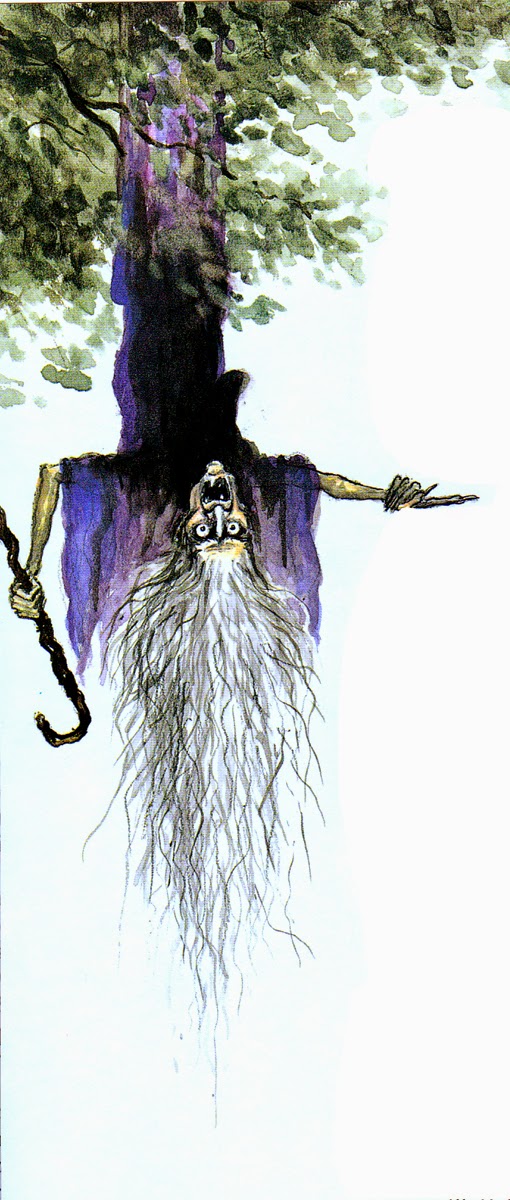 |
| All illustrations in this post are by Hudson Talbott for his adaptation of an Into The Woods picture book |
Rapunzel Lives! The Wolf is Not a Lech! The Baker's Wife is Not Unfaithful! HAEs for Everybody!
What was the point of "Into The Woods" again?
It's taken me a few days to figure out just want I want to say about this news but my thoughts on the matter have basically stayed the same, because, be honest: I expected it. Heck, you expected it. You (and I) really, really, REALLY hoped it wouldn't happen, but it did. The edgy musical favorite, Into the Woods, which turns the popular view of fairy tales on its head by taking a gritty look at some very real consequences of fairy tale actions (in Act II), has been Disneyfied, or in fancier terms:
(The) more subversive elements of the Brothers Grimm-themed story (have) been excised by studio chiefs.
"You will find in the movie that Rapunzel does not get killed, and the Prince does not sleep with the [Baker's Wife]," (Sondheim) told an audience of drama teachers at Sardi's restaurant in New York, also noting that Disney had objected to the sexualisation of the relationship between Little Red Riding Hood and the wolf. Added Sondheim: "Disney said, we don't want Rapunzel to die, so we replotted it. I won't tell you what happens, but we wrote a new song to cover it."
While James Lapine, (original Into The Woods writer) reportedly argued against the rewrites with Disney (but lost the battle) Stephen Sondheim (original composer/lyricist for Into the Woods) has defended the changes (from HERE):
Sondheim said teachers had a duty to explain to their students that creative licence could be undermined by social conservatism. "[You] have to explain to them that censorship is part of our puritanical ethics, and it's something that they're going to have to deal with," he said. "There has to be a point at which you don't compromise anymore, but that may mean that you won't get anyone to sell your painting or perform your musical. You have to deal with reality."Translation: To Sondheim, it was worth the money to let Disney "Disneyfy" it. He wanted to get paid.
Ya know, I get that. We all gotta eat.
BUT.
It's INTO THE WOODS! aka the Disney-fication-antidote!
-strangle-sounds-
At least we've been warned.
Will it hurt box office? Unlikely. At least not for opening weekend.
Because, in the end, again in the spirit of being honest, the original Sondheim/Lapine team are still on this so there's still a chance it might be good, and you want to know how they dealt with it all, just as much as I do, don't you? DON'T YOU?!
Argh.
-headdesk-
Bonus Brain Stretcher for the day:
There's an interesting article from the Washington Post HERE about why Disney cannot tell grown-up stories. While there are some interesting points, and it makes a good argument for the predictable patterns in (current) Disney storytelling, I think it also makes it even clearer that society in general doesn't really understand the essence of simple timeless stories, or of fairy tales. Fairy tales in particular may be condensed, spare and even, in some ways, simplistic, but they are never "childish". And I have to agree with the author on this point (below):
There is big money in happy endings, ...and Disney can complicate its brand only so much.This is the same problem the company has in other areas, and the reason we hear so many complaints about a juvenile strain in popular media. If your brand relies on the idea that Captain America is a good, trustworthy person,you can only go so far in encouraging your audience to think critically about the implications of giving a single person the ability to do great violence. If you are in the business of selling happy endings, your customers might get less enthusiastic as they become convinced that “ever after” is not an ironclad guarantee.
Sources: HERE, HERE, HERE, HERE & HERE.









